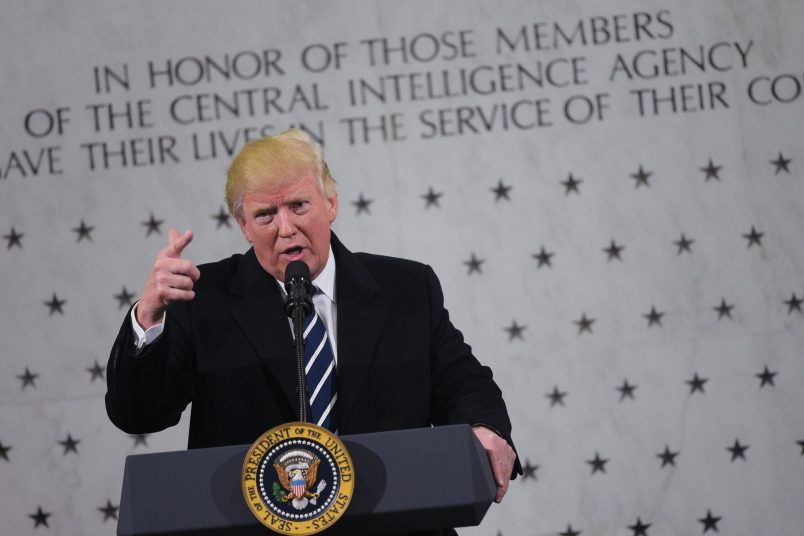Throughout the past seven years, Trump has cast the intelligence community as one of his main opponents.
He’s falsely accused the country’s spooks of lying about him, trying to undermine his presidency, of fomenting a supposed hoax to subvert him, and tended to ignore or reject their professional assessments.
But now that the intelligence community may offer him a sliver of advantage for one line of argument in the Jan. 6 case against him, Trump is suddenly all in, touting the years of warnings that American elections are vulnerable to foreign interference.
Trump is asking a judge to force the special counsel’s office to turn over records from the intelligence community that he wants to use at trial for the Jan. 6 case, where he faces charges of conspiracy to defraud the United States, conspiracy to obstruct an official proceeding, obstruction of an official proceeding, and conspiracy against rights.
What Trump wants includes reports on damage wrought by Russia’s interference in the 2016 election and threats to the 2020 election. It’s part of a series of defenses which Trump wants to raise at trial aimed at debunking a core position of Special Counsel Jack Smith: that Trump spread lies about breaches in 2020 election because he was “motivated by a desire to maintain office and undertaken with specific intent and unlawful purpose,” his attorneys wrote in the request.
Trump also wants to counter arguments that his claims to have actually won the 2020 election but for massive, never-found fraud somehow contributed to mistrust in American elections. In fact, Trump attorneys wrote, the former president wants evidence about 2016 Russian interference “to demonstrate to the jury that he did not create or cause the environment that the prosecution seeks to blame him for.”
It’s an about-face which partly signifies the brief advantage which Trump might gain from presenting these records to jurors: arguing that Russian interference in 2016 corroded public trust to such an extent that his 2020 claims could not have had a comparable effect.
But these arguments are coming from the same person who, at a 2018 press conference in Helsinki, informed the public that Russian President Vladimir Putin had assured him that Moscow was not responsible for the 2016 interference, and that he believed him.
“He just said it’s not Russia,” Trump said, alongside the Russian leader. “I will say this: I don’t see any reason why it would be.”
Trump’s lawyers wrote elsewhere in the filing that the 2016 interference had “motivated” Trump to make extensive policy changes aimed at “foreign influence and cyber risks,” and “to be skeptical of claims about the absence of foreign influence in the 2020 election.”
In 2020, Trump’s allies went wild with claims of foreign interference. Trump White House Chief of Staff Mark Meadows ordered DOJ officials to examine the ItalyGate theory, which posits that an Italian defense contractor used military satellites to zap the election away from Trump. At a now-infamous November 2020 press conference, Rudy Giuliani appeared alongside Sidney Powell as she attributed Trump’s loss to a Venezuelan conspiracy helmed by deceased communist Hugo Chavez.
Part of Trump’s argument comes out of his battle with officials in his own administration who, beginning in November 2020, sought to make clear that the election had been secure. Trump attorneys are seeking information about Chris Krebs, the CISA leader who Trump fired after he released a statement describing the election as “the most secure in American history.”
Trump’s lawyers dismiss those people as “officials now favored by the prosecution,” but the statements they made about 2020’s security – both in private to Trump and in public – go to a key allegation in the indictment: that the former President continued to make and boost claims of foreign interference in 2020 even after he had repeatedly been told they were baseless.
Other filings in the dispute include letters between federal prosecutors and Trump’s attorneys over the requests.
There, prosecutors revealed some nuggets of information about where they’ve looked to investigate Trump’s 2020 coup attempt: the DOJ’s database of evidence regarding Jan. 6 rioters, a laptop given by a Michigan fake elector, and communications from DOJ employees during the Trump-Biden transition.
Some information, prosecutors said in a letter disclosed by Trump’s attorneys, had been made available thanks to five executive privilege waivers issued by the Biden White House.







So the fact that Russia helped Trump in 2016 by swaying public opinion via lies and distortions on social and other media is proof that he unfairly lost due to stolen/phony ballots in 2020? How does that work?!
Edit: First? Here’s a pic from the airplane that has more solidity than T-rump’s arguments:
DSC_9887|690x460
What he has requested has nothing to do with the charges on him. I’m not sure the judge will allow it. Dr. Wheeler has more on it:
This is just running interference, hoping to delay the trial, or have more ammunition for the appeal.
The Russia Russia Russia collaboration was much worse than the public knows. Russia knows. Your Republican representative knows.
We don’t.